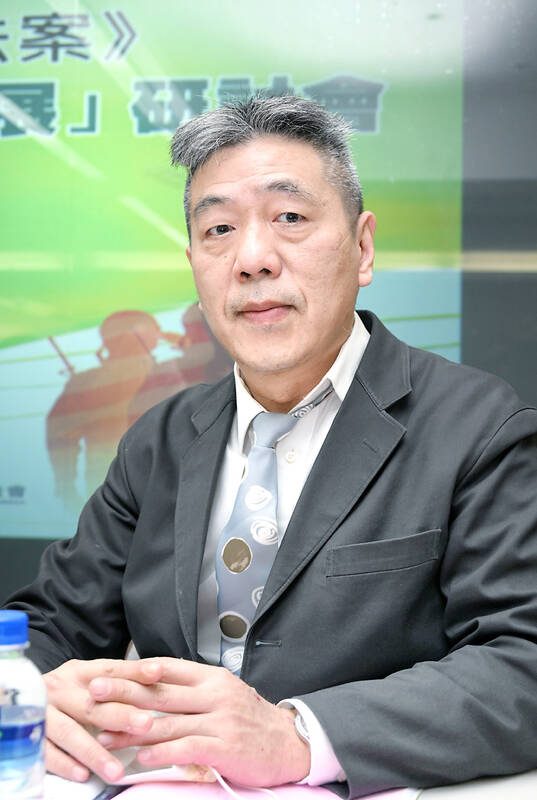The military backs the six defense-related technologies listed by the government as being among Taiwan’s 22 key core technologies to face stringent controls, due to national security reasons, the Ministry of National Defense said on Tuesday.
The six defense-related technologies include military-grade carbon fiber composite; carbon/carbon composite ablation materials; and interference rejection identification friend or foe (IFF) system technologies, the ministry said.
They also include military-grade technologies of microwave/infrared/multi-mode seeker, active phased array radar, and ramjet, a form of air-breathing jet engine that uses the forward motion of the engine to take in air for combustion that produces jet thrust, it said.

Photo: Fang Pin-chao, Taipei Times
The six technologies made the list according to recommendations by the ministry’s top research unit, the Chungshan Institute of Science and Technology (CSIST), to safeguard national security, it said in a statement.
The CSIST suggested the technologies based on two criteria, the ministry said.
First, Taiwan has an advantage in domestically developing or building those technologies, and second that it was urgent that they be put under government protection, the ministry said.
Institute for National Defense and Security Research fellow Su Tzu-yun (蘇紫雲) said the seeker technologies are particularly important.
The military-grade microwave/infrared/multi-mode seeker technology can enhance the ability of rocket and missile launch platform sensors to better identify and lock in enemy targets, including stealth aircraft, with the technology also used by fighter jets, uncrewed aerial vehicles and warships, he said.
Multi-mode seekers are being deployed for all kinds of rocket launchers, including the indigenous Hsiung Feng III supersonic anti-ship missile, Su said.
Beyond the benefits for the nation’s defense industry, the development of these key technologies can also support civilian purposes, such as applying the use of advanced infrared technology to autonomous vehicles, he said.
The six defense technologies were among 22 core technologies listed by the National Science and Technology Council (NSTC) to be under heightened controls to prevent technology leaks and bolster industrial competitiveness.
The 22 technologies cover five industries: defense, aerospace, agriculture, semiconductors and information and communications technology, the NSTC said.
“Key technologies” refer to technologies that, if exported to China, Macau, Hong Kong or “external hostile forces,” would significantly harm national security, industrial competitiveness, or economic development, the NSTC said, citing the National Security Act (國家安全法).
Those found obtaining trade secrets related to national core key technologies by way of “theft, embezzlement, fraud, coercion, unauthorized reproduction, or other improper methods, or using and disclosing them after obtaining them,” may face up to 12 years in prison and a fine of up to NT$100 million (US$3.17 million), as stipulated in the act.
SEE IC ON PAGE 12

Alain Robert, known as the "French Spider-Man," praised Alex Honnold as exceptionally well-prepared after the US climber completed a free solo ascent of Taipei 101 yesterday. Robert said Honnold's ascent of the 508m-tall skyscraper in just more than one-and-a-half hours without using safety ropes or equipment was a remarkable achievement. "This is my life," he said in an interview conducted in French, adding that he liked the feeling of being "on the edge of danger." The 63-year-old Frenchman climbed Taipei 101 using ropes in December 2004, taking about four hours to reach the top. On a one-to-10 scale of difficulty, Robert said Taipei 101

Nipah virus infection is to be officially listed as a category 5 notifiable infectious disease in Taiwan in March, while clinical treatment guidelines are being formulated, the Centers for Disease Control (CDC) said yesterday. With Nipah infections being reported in other countries and considering its relatively high fatality rate, the centers on Jan. 16 announced that it would be listed as a notifiable infectious disease to bolster the nation’s systematic early warning system and increase public awareness, the CDC said. Bangladesh reported four fatal cases last year in separate districts, with three linked to raw date palm sap consumption, CDC Epidemic Intelligence

US climber Alex Honnold left Taiwan this morning a day after completing a free-solo ascent of Taipei 101, a feat that drew cheers from onlookers and gained widespread international attention. Honnold yesterday scaled the 101-story skyscraper without a rope or safety harness. The climb — the highest urban free-solo ascent ever attempted — took just more than 90 minutes and was streamed live on Netflix. It was covered by major international news outlets including CNN, the New York Times, the Guardian and the Wall Street Journal. As Honnold prepared to leave Taiwan today, he attracted a crowd when he and his wife, Sanni,

Taiwanese and US defense groups are collaborating to introduce deployable, semi-autonomous manufacturing systems for drones and components in a boost to the nation’s supply chain resilience. Taiwan’s G-Tech Optroelectronics Corp subsidiary GTOC and the US’ Aerkomm Inc on Friday announced an agreement with fellow US-based Firestorm Lab to adopt the latter’s xCell, a technology featuring 3D printers fitted in 6.1m container units. The systems enable aerial platforms and parts to be produced in high volumes from dispersed nodes capable of rapid redeployment, to minimize the risk of enemy strikes and to meet field requirements, they said. Firestorm chief technology officer Ian Muceus said